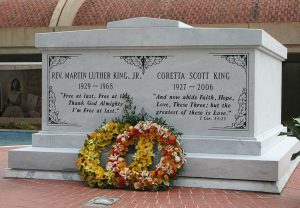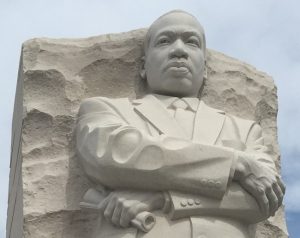Martin Luther King Jr. Day - January 20, 2020
Martin Luther King Jr. Day is a federal holiday that occurs on the third Monday in January. The first bill to introduce the idea for a holiday in honor of Dr. King came just four days after his death. Michigan representative John Conyers was the one the submit this bill. However, the holiday was not made into law until fifteen years later.
At the time of Martin Luther King Jr.’s assassination, Dr. King was a more controversial figure than he is now. His criticism of U.S. foreign policy, specifically the Vietnam War, caused many politicians and activists to dislike him. Here, you can see a recently digitized video clip of Dr. King speaking at a press conference about Vietnam. The Federal Bureau of Investigation (FBI) had also smeared his name during his career; trying to prove that he was a communist threat to the United States. This was another reason why his reputation at the time of his death was not as high as it is today.
Conyers was one of the few black members of Congress, and had been active in the Civil Rights Movement. Even though his first bill failed, he kept reintroducing it year after year, getting more support in congress, hoping for it to pass. Support for the holiday gained momentum in 1979 when Coretta Scott King, Dr. King’s widow, testified at a congressional hearing. In November of 1979, the bill was defeated by five votes. Coretta then worked with politicians all over the country to generate support for the bill. The tide really began to turn when Stevie Wonder released the song “Happy Birthday” in 1980. Stevie wrote the song about Dr. King, resulting in major public support for the holiday.
In 1983, Civil Rights Movement veterans gathered in Washington D.C. to commemorate the 20th anniversary of the March on Washington and Dr. King’s famous “I Have a Dream” speech. It also commemorated the fifteenth anniversary of his death. This gathering is said to have created the last push of support for the bill to move forward in congress. Despite attempts to stall the bill and prevent its passage, the bill passed the House and the Senate, and President Ronald Reagan signed it immediately. However, it did not take effect until 1986.
President Reagan’s proclamation on January 18, 1986 explained the reason for this new federal holiday,
"This year marks the first observance of the birthday of Dr. Martin Luther King, Jr. as a national holiday. It is a time for rejoicing and reflecting. We rejoice because, in his short life, Dr. King, by his preaching, his example, and his leadership, helped to move us closer to the ideals on which America was founded... He challenged us to make real the promise of America as a land of freedom, equality, opportunity, and brotherhood."
Even though the holiday was first celebrated in 1986, not every state observed it initially. Many southern states initially combined it with another January holiday that celebrated the birthday of Robert E. Lee, the leader of the confederate army during the civil war. The last state to adopt the holiday was New Hampshire in 1999. Even though it is federal holiday, not every school or place of business chooses to observe it. Just like with Columbus Day, President’s Day and Veterans Day, it is not a day that everyone gets off.
Even though the Boston Public Library will be closed for the holiday, there are other institutions around the city that will remain open. Many of them will have programs for kids that emphasize parts of Dr. King’s message and legacy. For instance, this year the Museum of Fine Arts in Boston has free admission on the holiday. The Isabella Stewart Gardener Museum will have special performances by artists committed to social justice and service. In addition, they will have family workshops with Wee the People, a Boston-based social justice organization. Check with institutions near you to see what programs they have available for the holiday.
Learn more about Dr. King and get inspired with these titles:
Martin Luther King Jr.'s Microphone (Nonfiction. Children: Ages 8-10)
I Am Martin Luther King, Jr (Nonfiction. Children: Ages 8-10)
King (Nonfiction.Teens)
Dear Martin (Fiction.Teens)
The Promise and the Dream (Nonfiction. Adults)
Redemption (Nonfiction. Adults)




Add a comment to: The Origins and Practices of Martin Luther King Jr. Day